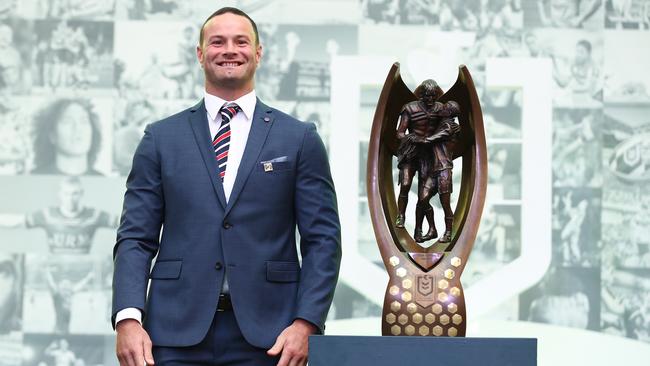Boyd Cordner’s journey from nervous teen to leader of men
Boyd Cordner’s game has been built around service to other players, insists coach Trent Robinson.

Roosters
Don't miss out on the headlines from Roosters. Followed categories will be added to My News.
All the resoluteness and spirit and determination and grit and grunt and Tamarama-sized heart in Boyd Cordner, and all his burning passion for the Sydney Roosters, and all the pride and responsibility he takes in the captaincy, was on high-vis display when he refused to put State of Origin commitments ahead of the dire need for him to dust himself off, crawl off the physio table and hobble out for the premiers in a complicated stretch of their NRL season.
“We had lost against Newcastle, poorly, and then he went and played Origin,” Roosters coach Trent Robinson said ahead of Sunday night’s grand final against Canberra.
“They lost the first week and he was battered. I was planning on giving him a rest and he said, ‘I have to play’. It wasn’t a choice for him. Then I was ready to give him the next week off because we lost against Penrith. He had an Origin to go to in Perth. He said: ‘I have to play again, I have to play. I will go and get Origin done but I need to play. This is my club’. He did and we had a really good win. Then he went off and won two games in a row. I thanked him afterwards. It was a special moment from him.”
Sydney players rolled into three cafes at the Entertainment Quarter on Monday morning. Jared Waerea-Hargreaves strode into Café 2151 and hugged anything and everything in a Roosters jersey. Rubbed foreheads with Angus Crichton. Called out to no one in particular, “How good is this? Grand final week.” He was jumping out of his skin.
Cordner, less so. He’s been here in big weeks, massive matches, he’s done that, he has all the T-shirts, lifted all the trophies. The past two Origin series have finished with Cordner’s Clovelly-sized biceps hoisting the shield. Sunday night could be the second straight NRL grand final that concludes on the same note: Cordner’s triumphant roar, silverware in hand, job done like a hard-working tradie. He’s a raging success as leader of club, state, country.
“The biggest thing with me learning about leadership has been just living through the actual experiences,” Cordner said.
“I was captain at a young age with the Roosters and Origin and Australia, and the older I get, the more comfortable I’ll be. Because you start to feel like you’ve been around a bit and there’s many surprises.
“I think leadership qualities, you either have them when you’re young or you don’t have them at all. Then it’s up to you to build on it and keep growing. Get knowledge.
“I’m lucky. I’m at a great club with a lot of senior boys who help me, and then there’s Robbo, as the leader of the club. His influence on my career as a player and captain has been enormous. Every year is different, but every year I start to get more comfortable in the role.
“My junior teams, I always seemed to be captain of those. I suppose back then, the best player in the team, they just made him captain. And then rep teams started picking me as captain because I’d already been a captain.
“I think I grew up pretty quick at a young age, losing my mother when I was young. I hung out a lot with my brother, who was older, and then I moved from the country to Sydney when I was 16. That was being thrown into the deep end a bit.
“Training with guys like Willie Mason and Mark O’Meley straight away, I had to mature pretty quickly.
“The tough times really shape your career more than the good times. The times you build your resilience. I moved out of home when I was young. I had a lot of injuries when I was younger. I had to fight through those. I had to learn how to deal with things on my own. I moved to Sydney by myself and had to work out a lot of things. No parents were here. No grandparents.
“I look back at being 16 and I think wow, how did I do that? But I was just so motivated. So determined. I wanted to do this as a career and be the best and play NRL. I was willing to do anything it took. I had to learn on the run. Handle pressure and downfalls.
“I guess they’re the qualities coaches have seen in me, and why I’ve been fortunate enough to get captaincies. You end up lifting a trophy with the team and it’s nothing but pure joy. Relief. It’s awesome. You play to win, and you’ve just won. Lifting trophies will never get old.”
Robinson said: “A lot of guys are good on-field leaders and a lot of that comes through the way they physically lead on the field. Usually that starts with a selfish approach: I’m going to lead and you follow me. But Boyd’s game has been built around service to other players. It is very selfless in its style.
“Knowing when to tell players the truth or pat them on the back has developed over the years. His ability to lead with his words and his heart, off the field, has improved massively. Incredibly. His heart has got bigger and bigger for the team and club and state and country. He has been able to articulate that in a real man’s man way.”
